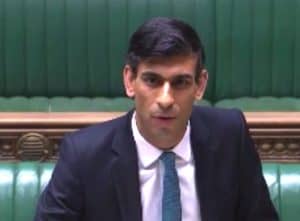 UK Chancellor Rishi Sunak updated the House (on November 9, 2020) regarding ongoing plans for the country’s financial services industry, which is one of the “most productive and innovative sectors.”
UK Chancellor Rishi Sunak updated the House (on November 9, 2020) regarding ongoing plans for the country’s financial services industry, which is one of the “most productive and innovative sectors.”
Sunak believes that financial services will be essential to the UK’s economic recovery from the COVID-19 pandemic. The high-potential financial services and Fintech space may help create new jobs that would stimulate economic growth across the country, Sunak noted.
He also mentioned that as the UK prepares to leave the European Union (EU), it will focus on beginning a new chapter in the history of modern Fintech and financial services. The Chancellor confirmed that he intends to renew the UK’s position as “the world’s preeminent financial centre.”
Sunak added that the UK’s Economic Secretary to the Treasury (John Glen) will be responsible for laying the foundations later today (on November 9) through the Financial Services Bill.
Sunak stated:
“I want to put the [Financial Services] Bill into context, by setting out for the House our plans to make this country more open; more technologically advanced; and a world-leader in the use of green finance….Financial services have been fundamental to Britain’s economic strength for centuries. And they remain fundamental today.”
He added:
“The vigor and creativity of this industry adds over £130 billion of value to the UK economy; Employs over a million people … and has been a critical source of revenues to support the NHS through coronavirus, contributing nearly £76bn in tax receipts last year.”
The Chancellor further noted that it might not be the case that “financial services” and the “City of London” are “synonyms.” He pointed out that two-thirds of the nation’s residents who work in the financial and professional services sector are actually based outside London, in places such as Edinburgh, Leeds, Durham, Cardiff and Belfast.
Sunak also mentioned that about half of the UK’s financial services exports have actually come from outside London with the North and Midlands now exporting about as much as France’s entire financial services sector.
Sunak claims that the UK’s financial services sector is “better regulated, better capitalized and more resilient than in 2008.”
He confirmed that the UK government remains focused on “supporting vulnerable customers.” He also noted that they’re “working at extraordinary pace to deliver over £60 billion of new loan schemes.”
Sunak further stated:
“One of the central mechanisms for managing our cross-border financial services activity with the EU and beyond, is equivalence. I remain firmly of the view that it is in both the UK and EU’s interests to reach a comprehensive set of mutual decisions on equivalence. Throughout, our ambition has been to manage these cooperatively with the EU. But it is now clear there are many areas where the EU is simply not prepared to even assess the UK. So we need to now decide on how best to proceed.”
He clarified that the UK will always aim to maintain a constructive, positive, and engaged relationship with the EU. However, it’s now time for the UK to move forward as a nation and do what’s right for its citizens, Sunak said.
Sunak added that he aims to offer “certainty and stability” to the UK’s financial services sector. The focus will also be on establishing an open, regulated financial market.
The Chancellor confirmed that he’s releasing a set of equivalence decisions for the EU and EEA Member States and he’s also publishing an extensive framework for the UK’s approach to equivalence more generally.
.He added:
“[Due to] the absence of clarity from the EU, we’re acting unilaterally to provide certainty to firms both here and in Europe.”
He continued:
“We will use equivalence when it is in the UK’s economic interests to do so taking a technical, outcomes-based approach that prioritizes stability, openness, and transparency. …we now have the freedom to build new, deeper financial services relationships with countries outside the European Union.”
Sunak further noted that he’ll be establishing a task force that will focus on boosting the number of new firms who are interested in listing in the UK. The goal is to build on the 113,000 jobs that have been supported by investment management, Sunak confirmed. He also noted that a consultation on reforming the UK’s existing regime for investment funds will be released soon.
He also stated:
“Building on our existing strengths as a leading global destination to start, grow and invest in FinTech…We’re staying at the cutting-edge of payments technologies where we’ve just concluded the first stage of our Payments Landscape Review and will shortly publish new plans to support the sector.”
He further noted:
“And by making sure our regulatory environment is ready to manage the far-reaching implications of technology on money itself. We’ll publish a consultation shortly to make sure new forms of privately-issued currencies, known as stablecoins, meet the same high standards we expect of other payment methods. And the Bank of England and the Treasury are considering further if central banks can issue their own digital currencies, as a complement to cash.”
(Please note: to read the UK Chancellor’s full speech, check here.)

